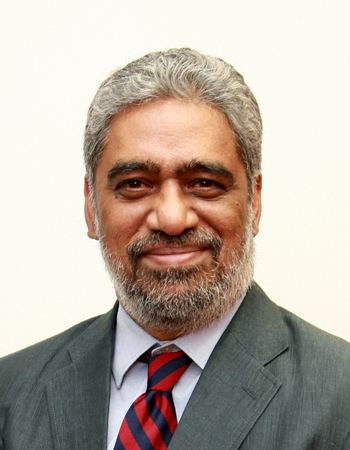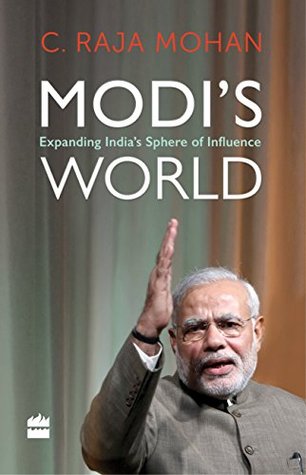Narendra Damodardas Modi, former Chief Minister of Gujrat and 15th Prime Minister of India has calculatedly inaugurated an ambitious era of multidimensional economic growth, technological advancements, political developments and social reforms for his country. Moreover, the regional and extra-regional foreign policy approaches of Modi coupled with substantial diplomatic aspirations attempt to luminously decorate Indian image globally. His multiple foreign trips, interaction with Indian diaspora across the globe, exclusive focus on the business community, and religious cemented political conduct have invigorated the academic potential of Indian political commentators. Various authors, including C. Raja Mohan attempt to scholarly comprehend the Indian politics under Modi stewardship.
The collection of articles of two years (2014 and 2015) from The Indian Express under Modi’s World: Expanding India’s Sphere of Influence presents Mohan’s scholarly slant aims to study Modi’s political vision under his diplomatic prophecy. Mohan is the founding director of Carnegie Endowment for International Peace (New Delhi, India), distinguished fellow at the Observer Research Foundation after actively serving three different terms on India’s National Security Advisory Board. In addition to his academic services in various universities, the scholarly journalistic attributes of Mohan’s vision have been contributed to various newspapers. After revealing various extent of Indian foreign policy in his three books, he tries to provide an insight of several regional and extra-regional stints of India under Modi in his fourth book.
The work of Mohan, India’s leading strategic intellectual, on Modi’s proactive political vision comprises ten chapters. The first two chapters discuss India’s political history, strategic culture and major security challenges. The subsequent chapters emphasize New Delhi’s disturbed relations with neighboring states, China and Pakistan respectively. The genesis of Indo–US strategic nexus, Modi–Obama diplomatic relations and an analytical survey of Washington – New Delhi’s strategic interests are core ideas focused in chapter six. Modi’s political attitude towards Japan, South Korea, Australia, Vietnam, along with Middle Eastern and Gulf regions revitalize India’s engagements with Asia, according to Mohan. The succeeding portions of the book examine Modi’s response toward Southeast Asian states and ASEAN under New Delhi’s Look East Policy, and notion of Sagar Mala as a counterbalancing force to the String of Pearls. The ninth chapter of Mohan’s volume focuses on the altitude of India’s soft power by highlighting Modi’s jettisoning religious commonalities with Buddhism and Sikhism. Modi’s religious lexicon and its promotion around the globe enlightens filament of India’s cultural diplomacy. In the end, the author overestimates Modi’s leadership by calling India a Leading Power. The inappropriate calculations of Mohan have not taken into account New Delhi’s toxic relations with its immediate neighbors, the unchecked growth of Indian strategic forces, and India’s growing inflexibilities for the restoration of regional peace and stability.
The scholarly discrepancies in the book undoubtedly overemphasize Modi’s prophecy by mentioning India as ‘Vishwaguru’ (a teacher of the world). It further advocates vividly India’s international obligation for moral-politik. (p. 203–209). The whole study of Mohan, in this way, unequivocally reflects an academic dedication to Modi’s policies. The author believes that the combination of various ideas such as modernity, leadership, and scientific progress could help India to apprehend its actual national potential under Modi. Moreover, the author visualizes Modi as an enthusiastic, energetic, and pragmatic leader. Eventually, Mohan hopes the new government would possess adequate potential to introduce a purposeful and confidential era in New Delhi’s foreign policy. While earnestly considering global power equation among great powers, Modi carries rationally strategic aspirations of India which are profoundly engaged in actively evolving Indian diplomatic powers.

Mohan’s work pays very little attention towards communal polarization in India under Modi, the violation of minorities and an unforgettable account of issues attached to Hindu majoritarianism. Mohan suggests Modi priorities on minority problems by overhauling Hindutva’s anomalies. The adventurous policy toward Muslims would deteriorate Indo–Pak bilateral relations (p.70). Parallel to diplomatic attributes of contemporary India, the writer attempts to provide reluctantly a critical examination of New Delhi’s foreign policy. In Mohan’s view, an exclusive concentration on neighborhood diplomacy can significantly preserve and categorically refine Indian image internationally by marking a new era in Indian history (p.165). In short, the concise work of Mohan’s scholarly work views Modi’s indisputable departure from the traditional domain of Indian foreign policy by adequately underlining the traditional issues of his predecessors. In short, Mohan’s book offers an excellent account of New Delhi’s position in the changing political landscape of world politics which can safeguard New Delhi’s vital interest under the Modi administration. Instead of overtly maintaining an impartial account of considerably convincing rationale of New Delhi’s regional and international political vision, Mohan’s intellectual skepticism espouses a more obsequious and less critical views in his book.
A compendium of articles or chapters in the book rotate around India’s role in changing the regional and international world order while presenting Mohan’s speculative perspective on various foreign policy initiatives of his government. An academically journalistic approach of Mohan represents an analytical account of most significant leadership of both governments, former Congress and newly elected BJP. In short, Mohan’s intellect about Modi can help exclusively the authors working on Indian foreign policy, Narendra Modi’s leadership, BJP’s politics, and New Delhi’s global ambitions. Coupled with his writings, Mohan’s intellectual orientation constantly shares his thoughts with other authors. His second co-edited work with Anit Mukherjee Indian Naval Strategy and Asian Security published recently is followed by another co-edited study Power Realignment in Asia: China, India and the United States.





